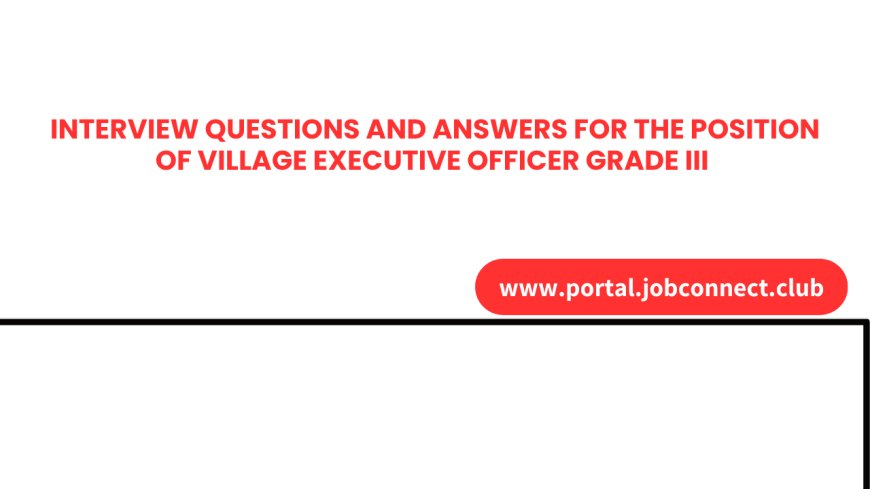INTERVIEW QUESTIONS AND ANSWERS FOR THE POSITION OF VILLAGE EXECUTIVE OFFICER GRADE III IN TANZANIA
This article provides essential interview questions and answers for candidates applying for the position of Village Executive Officer Grade III in various Local Government Authorities, Municipalities, and City Councils across Tanzania.

1. What is the structure of the Council of Councillors?
Answer:
-
Councillors elected from each ward.
-
Special seat councillors (e.g., women representatives).
-
District Commissioner or Executive Director of the Council – serves as the secretary of the council.
2. a) Name the member countries of the East African Community (EAC).
Answer:
Tanzania, Kenya, Uganda, Rwanda, Burundi, South Sudan, Democratic Republic of Congo (DRC).
b) Mention four main challenges facing the EAC. Answer:
-
Lack of unified economic and social policies.
-
Trade conflicts and economic competition.
-
Political differences among member states.
-
Cross-border security and immigration issues.
3. a) Define development.
Answer: Development is the process of improving the economic, social, and political conditions of a community. Example: building infrastructure such as roads, health centers, and schools.
b) What is sustainable development? Answer: Development that meets present needs without compromising future generations' ability to meet their own. Example: using solar energy instead of fossil fuels.
c) What is green economy? Answer: An economy that promotes environmental protection and sustainable use of natural resources. Example: modern farming techniques that conserve water and land.
4. Briefly explain the history of Local Government Authorities in Tanzania.
Answer: Local Government Authorities were established after Tanzania gained independence in 1961. They were reintroduced in 1982 to decentralize power and bring services closer to the people, promoting community development and good governance.
5. What should a fixed asset register contain?
Answer:
-
Type and location of the asset.
-
Owner's name.
-
Purchase cost and date.
-
Value appreciation.
-
Sale and disposal records.
-
Each asset recorded on a separate page.
6. What are the key disaster preparedness measures?
Answer:
-
Planning strategies to prevent or minimize the impact of disasters.
-
Empowering communities to implement those strategies.
7. What are the main ways to manage conflicts in communities?
Answer:
-
Promoting good governance at all levels.
-
Educating communities on governance principles.
-
Building mutual respect and cooperation among groups.
-
Strengthening leadership-community relationships.
8. What conditions must be met for a meeting to be considered valid?
Answer:
-
Quorum (required number of attendees).
-
Presence of a chairperson and secretary.
-
Set agenda.
-
Proper minutes of the meeting.
9. How will you ensure proper financial collection records in the village?
Answer:
-
Maintaining payment registers.
-
Issuing official receipts.
-
Using payment documentation.
10. How will you ensure proper use of public resources in the village?
Answer:
-
Strategic planning.
-
Appointing responsible supervisors.
-
Creating monitoring committees.
-
Establishing effective communication and control systems.
11. List five actions to fight poverty in villages.
Answer:
-
Assessing poverty levels.
-
Identifying causes of poverty.
-
Educating villagers about poverty reduction.
-
Encouraging use of local opportunities.
-
Forming productive groups.
12. How will you implement proper agricultural practices in your village?
Answer:
-
Early land preparation.
-
Timely planting according to weather conditions.
-
Selecting quality seeds.
-
Proper storage of crops.
13. List major union matters between Mainland Tanzania and Zanzibar.
Answer:
-
The Constitution and Union Government.
-
Defense and security.
-
Immigration and citizenship.
-
Taxation, foreign trade and education.
-
Currency and financial matters.
-
Judiciary and statistics.
14. Mention five indicators of poverty in Tanzania.
Answer:
-
Illiteracy.
-
Lack of access to basic needs.
-
Inadequate health services.
-
Malnutrition.
-
High unemployment and low income.
15. What are the key steps when managing government documents?
Answer:
-
Verifying authenticity.
-
Analyzing the content.
-
Organizing and categorizing.
-
Storing properly in files and archives.
16. What are the functions of the Village General Assembly?
Answer:
-
Reviewing project implementation reports.
-
Reviewing financial reports.
-
Discussing land allocation requests.
-
Approving budgets and development plans.
-
Electing village chairpersons.
-
Approving bylaws before submission to the District Council.
17. State the principles of good governance.
Answer:
-
Rule of law.
-
Democracy.
-
Transparency.
-
Accountability.
-
Inclusiveness.
-
Efficiency.
18. Mention five sources of revenue for District Councils.
Answer:
-
Internal revenues.
-
Community contributions.
-
Loans.
-
Donor funds.
-
Grants from central government.
19. What are the national symbols of Tanzania?
Answer:
-
National flag.
-
National anthem.
-
National emblem.
-
National currency.
-
The Uhuru Torch.
20. List five core values of public service ethics.
Answer:
-
Integrity.
-
Impartiality.
-
Hard work.
-
Obedience to government.
-
Maintaining confidentiality.
21. What do the colors on the Tanzanian flag represent?
Answer:
-
Black – People of Africa.
-
Green – Agriculture and vegetation.
-
Yellow – Mineral resources.
-
Blue – Water bodies (lakes, rivers, ocean).
22. What are the duties of a Village Executive Officer?
Answer:
-
Advising the village government on development plans.
-
Managing village revenues and expenditures.
-
Acting as the peacekeeper and governance enforcer.
-
Coordinating technical departments in the village.
-
Leading campaigns against poverty and hunger.